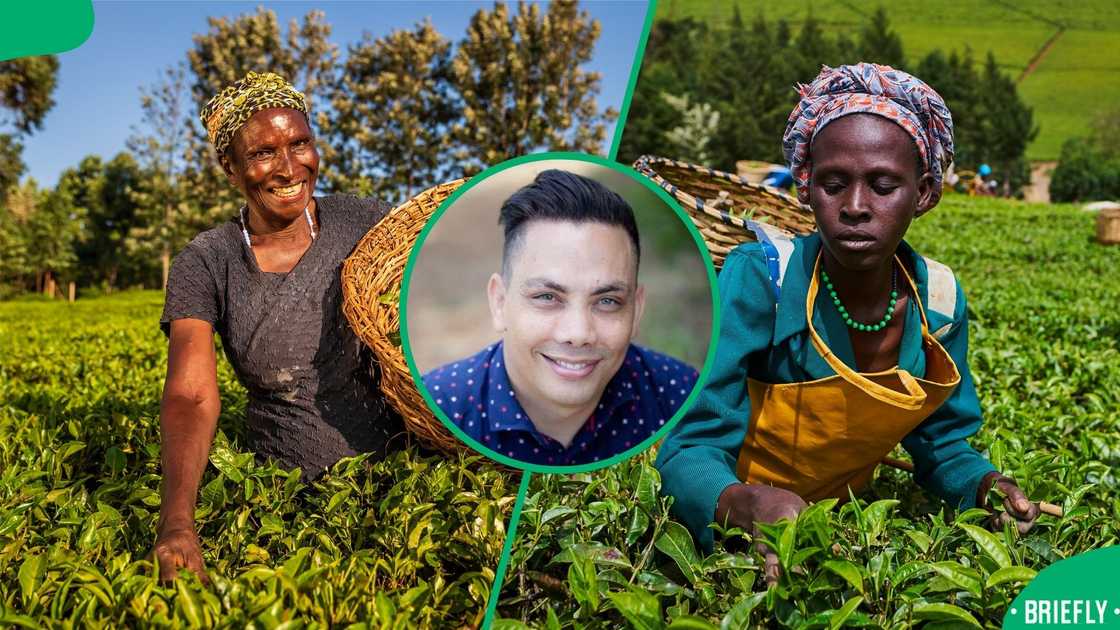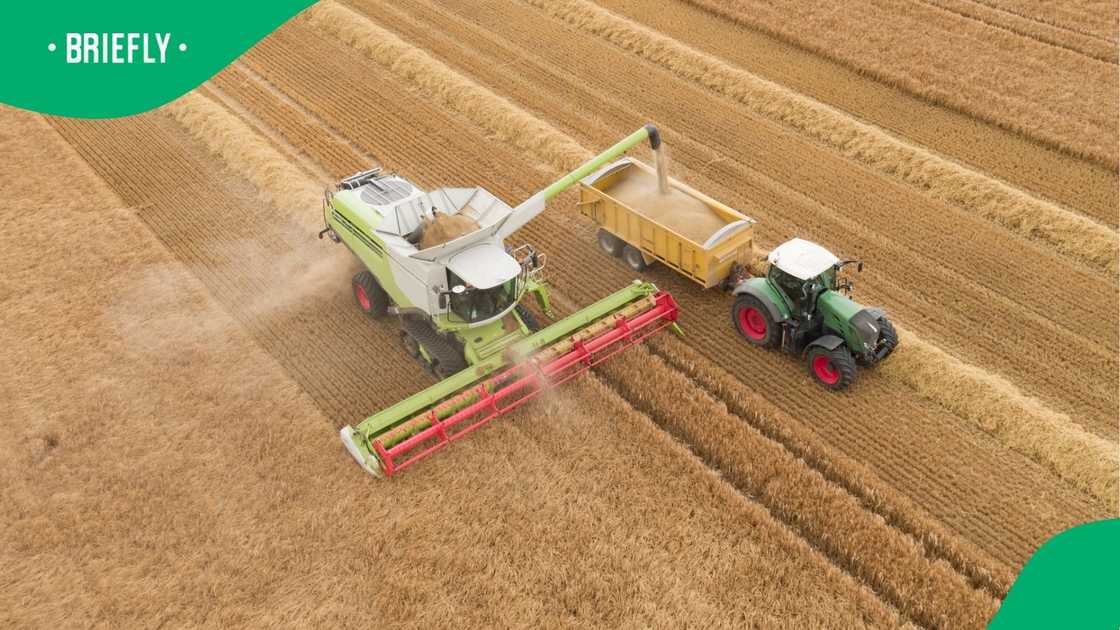Adapting to Climate Change, Securing SA’s Food Future
Roscoe is a SA-TIED PhD Scholarship holder from United Nations University - World Institute for Development Economic Research (UNU-Wider) where he is in the process of completing a PhD in economics from University of Cape Town. Roscoe does research in Macroeconomics, Microeconomics, Food security, Financial Economics, International Economics and Econometrics.
Food insecurity is rising in South Africa - climate-smart farming is key to feeding a growing population.
The impacts of climate change threaten up to a 50% decline in South Africa’s agricultural production by 2050, growing the ranks of the 1 in 5 people who live daily with food insecurity.

Source: UGC
Higher temperatures
Researchers have estimated that reduced rainfall and higher temperatures will cause a 25% increase in SA’s maize yield variability by 2050, leading to less predictable harvests and impacting agricultural livelihoods and food prices. Maize is a staple food source for poor households and is already showing annual price increases of 30% due to climate impacts on agricultural production.
PAY ATTENTION: stay informed and follow us on Google News!
Hunger and food insecurity, due to factors including the impact of climate change, affected approximately 21% of South African households (approximately 18 million households) in 2021, according to the National Food and Nutrition Security Survey.
Ensuring that more people have access to adequate, affordable and nutritious food calls for a new approach to supporting the agricultural sector—one that integrates enterprise development and climate adaptation strategies, says Stellenbosch Business School research fellow Roscoe van Wyk.
Key economic priority
Growing the agricultural sector and improving its productivity, especially in the face of climate change and a growing population, should be a key economic priority for South Africa, he said, particularly if the National Development Plan (NDP) goals of an “integrated and inclusive rural economy” and 1 million new jobs in the agricultural sector by 2030 are to be realised.
Agricultural productivity growth is generally two to three times more effective at reducing poverty than equivalent growth in other sectors, such as mining or manufacturing, as agricultural growth not only creates jobs and increases household incomes but also increases the food supply.

Read also
Moeletsi Mbeki sparks backlash with land reform comments, says colonisers help feed the nation
Van Wyk, who lectures in development finance and small-scale enterprise development at Stellenbosch Business School, said rising food prices disproportionately impacted low-income households, which spend a larger share of their income on food.
Household welfare
His research has found that a 1% increase in food prices reduces household welfare—the ability to meet basic needs, including food, healthcare, education and safety—by more than 20%.
Poverty levels in South Africa steadily declined in the democratic era, but these gains have reversed since the Covid-19 pandemic and are being worsened by the impact of climate change on agricultural production and rising food prices, said Van Wyk.
After decreasing between 2010 and 2019, South Africans’ vulnerability to hunger and lack of access to food are steadily rising back to pre-2010 levels.
“The impact of climate change is experienced not only in decreasing rainfall and higher temperatures, which reduce crop yields, but also in the rising incidence of extreme weather events such as less frequent but heavier rainfall leading to floods, interspersed with longer, harsher periods of drought.
These impacts substantially on livestock and crop health and production, while damage to infrastructure from extreme weather events disrupts agricultural and food supply chains.
“This, in turn, drives scarcity, leading to increased prices,” Van Wyk said.
Population continues to grow
Increases in crop production have not kept pace with population growth over the past two decades, and the population continues to grow while agricultural yields are declining, worsening the prospects of reducing the levels of food insecurity.
“To reduce food insecurity and hunger, we cannot aim just to maintain current levels of agricultural production. It has to be improved to meet the needs of a growing population, with the added challenge of adapting to the impacts of climate change,” he said.
Food security in rural areas, where poverty is greatest, is very closely tied to the agricultural value chain, Van Wyk said, both in terms of employment as well as in small-scale farming for market or subsistence farming to supplement food supply and to trade or barter.
Improving support to the agricultural sector—both in large-scale commercial farming and in small-scale, emerging and subsistence farming—has the potential to break the rural cycle of poverty and food insecurity.
“If we can get people able to feed themselves, by being employed or becoming commercially viable farmers, we can shrink the inequality gap and address poverty and unemployment.
We need to be putting money and resources into the production of affordable and more nutritious food, and investing in smart agricultural technology and innovation to enhance sustainability and mitigate against climate change impacts.
“That is how we will feed the nation in future,” Van Wyk said.

Source: Getty Images
Support enterprise development
He argues for a change in focus on how government supports small-scale and emerging farmers—that interventions to support enterprise development and commercial viability should be integrated with those, currently separate, to enhance sustainability and climate adaptation.
“Business-related support aimed at enabling subsistence, emerging and small-scale farmers to scale into financially viable, employment-creating food production businesses cannot be seen as a separate intervention to encouraging environmentally sustainable farming practices and implementing climate change mitigation and adaption measures.
“Under the economic conditions of the country and in agriculture, small-scale farmers are poor; they can’t be expected to have a sustainability strategy, nor to afford ‘smart agri’ technology. Enterprise development support for small-scale farmers must be linked to climate change, and support for sustainable infrastructure and climate-resistant crops.
“This will require not only funding but targeted education for farmers on increasing climate variability and its effects on farming activities and yields, and aspects such as more effective farm planning, diversification, insurance and better weather monitoring and forecasting,” Van Wyk said.
While South Africa has good plans and policies, the emphasis needs to move to implementation, he said, and on incentives for established farmers to mentor emerging farmers, and for emerging farmers in turn to scale up, create jobs and increase production.
3 More stories about climate change
- Briefly News also reported that food waste is not a crisis of scarcity, but of distribution. The environmental fallout of this imbalance includes wasted water, energy, land, and logistics – a silent climate threat hidden in plain sight.
- Schools in KwaZulu-Natal were celebrated for their eco-friendly efforts at the Sustainable Schools Regional Rewards Ceremony.
- G7 allies meet this week for climate talks that are likely to urge more action in a "critical decade", but could also lay bare divisions on ambitious fossil fuel commitments.
Disclaimer: The views and opinions expressed here are those of the author and do not necessarily reflect the official policy or position of Briefly News.
PAY ATTENTION: Follow Briefly News on Twitter and never miss the hottest topics! Find us at @brieflyza!
Source: Briefly News





